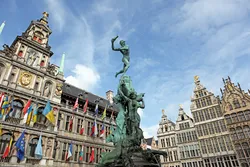See all articles relating to: Belgium

Belgium is a country located in Western Europe. Its strategic placement at the crossroads of Western Europe has made it a site of key historical events and conflicts, including both World Wars. Originating from the prosperous medieval territories of the Duchy of Brabant, County of Flanders, County of Hainaut, and the Prince-Bishopric of Liège, modern Belgium emerged as an independent nation in 1830 after a revolution against Dutch rule. The Belgian constitution, crafted the following year, established a parliamentary system that was ahead of its time in Europe. The country was famously the site of the Battle of Waterloo in 1815, where Napoleon Bonaparte was defeated. Belgium has been home to many significant figures, among them Victor Horta, a pioneer of Art Nouveau architecture; Georges Lemaître, the physicist and Catholic priest who first proposed the theory of the expansion of the Universe, often referred to as the "Big Bang" theory; and Audrey Hepburn, the iconic actress and humanitarian born in Brussels.
Research your ancestors on MyHeritage
The regions of BelgiumThe regions of Belgium
Belgium is divided into three regions:
- Flemish Region (Vlaams Gewest in Dutch) - This region is located in the northern part of the country and is predominantly Dutch-speaking.
- Walloon Region (Région Wallonne in French) - This region is located in the southern part of the country and is predominantly French-speaking. There is also a small German-speaking community in the east.
- Brussels-Capital Region (Région de Bruxelles-Capitale in French, Brussels Hoofdstedelijk Gewest in Dutch) - This region is officially bilingual (French and Dutch), and it is an enclave within the Flemish Region. It includes the capital city of Brussels.
Belgium historyBelgium history
See:
Belgium geographyBelgium geography
See:
Researching family history in BelgiumResearching family history in Belgium
See also:
- Belgium genealogy
- Belgium immigration
- Belgium emigration
- Belgium archives
- Vital records in Belgium
- Birth records in Belgium
- Death records in Belgium
- Marriage records in Belgium
- Census records in Belgium
- Civil registrations in Belgium
- Church records in Belgium
- Newspaper records in Belgium
- Military records in Belgium
Belgian ethnicityBelgian ethnicity

The majority of the population in Belgium is made up of two main ethnic groups: the Flemings, who inhabit the northern region of Flanders and primarily speak Dutch, and the Walloons, who reside in the southern region of Wallonia and primarily speak French. Additionally, a small German-speaking community resides in the east. In recent decades, Belgium has become home to a variety of other ethnicities due to immigration. This includes substantial communities of Italians, Moroccans, Turks, and people from various other European, African, and Asian countries, contributing to the multicultural fabric of contemporary Belgian society.
See also:
Belgian surnamesBelgian surnames

Belgian surnames can be a valuable tool in researching family history, offering a window into your ancestors' lives and potentially even their occupations, origins, or personal characteristics. Belgium's linguistic diversity is reflected in its surnames, with different naming conventions and influences found in the Dutch-speaking Flemish community, the French-speaking Walloon community, and the smaller German-speaking population. Flemish surnames often have prefixes like "Van" (meaning "from"), suggesting geographic origin, while Walloon surnames frequently reflect Latin and French influences. For example, "Van Damme" is a Flemish surname that means "from the dam" and is indicative of a person's geographic origin. Understanding these naming patterns can help genealogists trace family lines and geographic movement, recognize connections among individuals, and interpret historical documents.
Examples of different Belgian surnames:
See also:
Explore more about BelgiumExplore more about Belgium
- Belgian historical records on MyHeritage
- Vital records from Belgium on MyHeritage
- Black, Yellow, Red: Find Your Belgian Ancestors, webinar by Marie Cappart on Legacy Family Tree Webinars
- Beneluxury Archives! How to get the best out of Belgian, Dutch and Lux archives online, webinar by Marie Cappart on Legacy Family Tree Webinars

